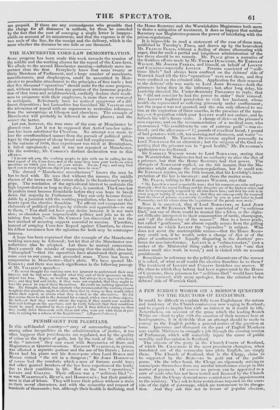PUNISHMENT FOR PLEBEIANS.
IN this self-lauded country—" envy of surrounding nations"— among other inequalities in the administration of justice, it too often happens that punishments are regulated, not by the quality of crime or the degree of guilt, but by the rank of the offenders, or the "interest" they cant exert with Secretaries of State and Magistrates at Quarter-sessions. GILBERT WAKEFIELD, in prison, tvas allowed a separate parlour and the use of his library ; LEIen RUNT had his piano and his flower-pots when Lord Byeos and Moono visited " the wit in a dungeon ;" Sir Joirs HonnousE of course had the comfiwts which a man of' fortune could buy; and other genteel breakers of the law have experienced the lenity due to their condition in life. Not so the two " operatives," LovErr and COLLINS. Their offence was a " seditious libel "— as was WAKEFIELD'S, HUNT'S, and Hounouses ; but their punish- ment is that of felons. They will leave their prison without a stain on their moral characters, and with the sympathy and respect of hundreds of thousands; but, although their health is declining, and the Home Secretary and the Warwickshire Magistrates both seem to desire a mitigation of treatment, it does so happen that neither Secretary nor Magistrates possess the power of interfering with the prison-regulations.
It is impossible to read a statement of the case of these men, published in Tuesday's Times, and drawn up by the benevolent Mr. FRANCIS PLACE, without a feeling of shame alternating with anger, that for such a partial and iniquitous administration of the law there should be no remedy. Mr. PLACE gives a narrative of the fruitless efforts mnde by Mr. TIIOMAS DUNCOMBE, Sir EARDLEY WILMOT, Mr. JosErn PARKES, and himself, on behalf of LOVETT and COLLINS—especially LovErr. Persons convicted of "sedi- tious libels" had always been confined on the debtors' side of' Warwick Gaol till the two "operatives" were sent there, and they were confined on the criminal side. Application for their removal to the debtors' side was made to Lord JOHN RussEEE—both the prisoners being then in the infirmary ; but, after long delay, his Lordship directed Mr. Under-Secretary Pnuaarrs to reply, that he " did not consider he had the power to order" their removal. Mrs. LOVETT implored permission to visit her husband, whose health she represented as suffering grievously under confinement ; but the request was not granted, and she was only allowed to see him at the expiration of three months, in the presence of the turn- key,—a degradation which poor LOVETT could not endure, and he forbade his wifis's future visits. A change of diet—at the prisoner's own expense, and on the recommendation of a medical man, who pronounced "his condition to be one of extreme peril"—was re- fbsed ; and the allowance—" Ifl pounds of excellent bread, 1 pound of bad potatoes with salt, tea morning and afternoon, and water "— was continued. Mr. THOMAS DeNeosinn applied personally to Lord Non:easily for an alteration ; but the surgeon of the Gaol re- porting that the prisoner was in " good health," Mr. DUNCOMBE'S application was ineffectual.
Sir EARDLEY WiLsior wrote to Lord NORMANDY, stating that the Warwickshire Magistrates had no authority to alter the diet of a prisoner, but that the Home Secretary had that power. The Marquis of NonsisNny replied, on the 8th instant, that the Ma- gistrates might change the prison-regulations, but he could not. Sir EarinEey rejoins, on the 10th instant, that his Lordship's inter- pretation of the law is incorrect : and there the matter rests.
Mr. PescE, writing to Sir EARDLEY WILMOT, says that " Mr. Lovett is a most respectable man; that his manners are calm and gen- tlemanly ; that his moral feelings and his integrity are of the highest order, and that he is consequently respected by all who know him ; and that his wife is in every respect worthy of such a man ; that they are consequently far removed front the class of persons so correctly described by you in your letter to Lord Normanby, and for whom alone the regulations of the prison were made." Now it is surmised, that if Lord NORMANIIY, or Lord Joins Russem, or Sir EARDLEY WIL:■IOT were convicted of "a seditious libel," not one of them would be treated like a felon, or the slight- est difficulty interietsed to their consumption of turtle, champagne, and "all tile delicacies of the season !" Men in a lower grade, but called " " are almost equally secure from the galling treatment to which LOVETT the "operative " is Subject. Who does not scout the contemptible excuse—that the Home Secre-
tary could not, if he would, order a change of diet or of the place of confinement ? Equally disgusting is the Justices' pre-
tence for non-interference. LOVETT is a "cabinet-maker," (not a maker of the Ministerial thing called a cabinet, but "one that makes small nice work in wood,") and is visited with an unusual punishment.
Sometimes in reference to the political discontents of the masses it is asked, of what avail would the elective franchise be to them?
The treatment of LOVETT and (7or,,,ess furnishes one answer. If the class to which they belong had been represented in the house of Commons, these pm soners for " seditious libel" would have been speedily removed, with many apologies, from the criminal to the debtors' side of Warwick Gaol.


























 Previous page
Previous page